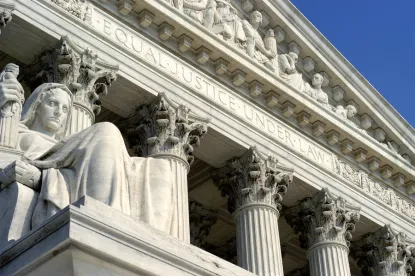Two new decisions this morning, including a major win for employers in Epic Systems Corp. v. Lewis (No. 16-285), which held (5-4) that neither the Federal Arbitration Act nor the National Labor Relations Act prohibits employers from requiring employees to submit to arbitration agreements that waive class-action rights. Not to give it short shrift, the Court's second opinion, Upper Skagit Indian Tribe v. Lundgren (No. 17-387), clarified that the Court's decision in County of Yakima v. Confederated Tribes and Bands of Yakima Nation (1992) did not hold that tribal sovereign immunity doesn't apply to suits in rem. Or something like that. If this is an issue of pressing concern for you, we encourage you to click the link and take a gander at the opinion. In the meantime, we owe you four more summaries from last week. Here goes!
First up, in McCoy v. Louisiana (No. 16-8255), the Court answered a question that you might have assumed answered itself: Can a defense attorney concede his client's guilt against the client's wishes? What makes the question slightly more nuanced is the context: What if the attorney believed that conceding guilt was the best, or only, way to spare his client from the death penalty?
Robert McCoy was charged with three counts of first-degree capital murder for the killing of his estranged wife's mother, stepfather, and son. His parents hired an attorney, Larry English, to represent him at trial. English concluded that the evidence against McCoy was so overwhelming that it would be impossible to avoid the death penalty unless he conceded guilt. When McCoy learned of English's intentions two weeks before trial, he voiced a forceful objection and sought new counsel. But the trial court refused to terminate English's representation of him so close to trial. English thus proceeded with his intended strategy, stating to the jury that McCoy committed the murders while urging mercy during the penalty phase in light of what English characterized as McCoy's emotional issues. English did permit McCoy to testify, however, and the defendant used the opportunity to maintain his innocence. The jury didn't buy it and convicted McCoy on all three capital counts. The Louisiana Supreme Court rejected McCoy's appeal, finding that English's strategy was reasonable under the circumstances in that it provided McCoy with the best chance of avoiding the death penalty.
The Supreme Court disagreed, in a 6-3 decision authored by Justice Ginsburg. Although the Court had held, in Florida v. Nixon (2004), that the Sixth Amendment permits counsel to concede a capital defendant's guilt where the defendant was silent on the matter, McCoy's case was materially different in light of his "intransigent and unambiguous objection" to English's strategy. That implicated the individual autonomy that is at the heart of the Sixth Amendment, which empowers a defendant to make the ultimate choice of asserting innocence or guilt. The Court was not persuaded by Louisiana's argument that presenting McCoy's unlikely alibi defense would have placed English in an ethical dilemma of choosing between honoring his client's wishes and assisting in the commission of perjury in violation of the Rules of Professional Conduct. McCoy never vowed to lie on the stand and English did not objectively know that McCoy's testimony, however implausible, would constitute perjury. His goal in conceding guilt was not to avoid an ethical dilemma but to build credibility with the jury—a worthy goal, but not one that could override McCoy's "Sixth Amendment-secured autonomy." Because this interest was so fundamental, the majority found that the violation of McCoy's Sixth Amendment right constituted structural error requiring a new trial, regardless of whether McCoy could show he was actually prejudiced by the error.
Justice Alito dissented, joined by Thomas and Gorsuch. The dissenters came at the question from English's perspective, rather than McCoy's. "What was English supposed to do?" Alito repeated. Given the compelling evidence of McCoy's guilt (which Alito described in far more detail than did Ginsburg), the incoherence of McCoy's alibi (a "conspiracy defense," in Alito's view), and the fact there was no time to permit English to withdraw before the trial, English was left with a Hobson's choice, and could not be blamed in hindsight for making the decision that he believed most benefitted his client. The dissenters pointed out that the issue in this case is unlikely to recur with any frequency and therefore questioned the wisdom of the Court weighing in definitively. Alito feared that this could open a Pandora's Box of get-out-of-jail (or execution) free cards. What if a prior felony conviction was an element of the offense? Would counsel really be constitutionally deficient for stipulating to a prior conviction over the defendant's vehement objection? That the majority couched this as a structural error—an issue not reached by the Louisiana Supreme Court—irked the dissenters all the more.
The Court answered another seemingly easy question in Byrd v. United States (No. 16-1371), unanimously holding (with some disagreement over the rationale) that an individual driver does not lose his reasonable expectation of privacy in a rental car that he lawfully possesses or controls merely because the rental agreement does not list him as an authorized driver.
The driver in this instance was Terrence Byrd, who was pulled over by a state trooper on Interstate 81 near Harrisburg, PA. The car Byrd was driving had been rented for him by his friend, Latasha Reed, while he waited outside the rental facility. Though Reed had given Byrd the keys to the rental car as soon as she left the building, her rental agreement specifically precluded unauthorized drivers from operating the vehicle, and Byrd was not listed as an authorized driver. When the police officers learned that Byrd was not the authorized driver on the rental agreement, they had themselves a look around and discovered 49 bricks of heroin and some body armor in the trunk. (Byrd had also admitted to having a marijuana cigarette in the car.) Byrd sought to suppress the evidence, but both the District Court and the Court of Appeals concluded that, because he was not listed on the rental agreement, he lacked a reasonable expectation of privacy in the car.
The Supreme Court reversed, 9-0. Writing for the Court, Justice Kennedy acknowledged that there is a diminished expectation of privacy in automobiles, which often permits officers to dispense with obtaining a warrant before conducting a search. However, the issue here was whether Byrd had any reasonable expectation of privacy in the rental car, given that he was technically not an authorized driver. To answer that question, Justice Kennedy looked to principles of property law to conclude that a driver's lack of authorization on the rental agreement is irrelevant to the Fourth Amendment question.
Relying on Rakas v. Illinois (1978), which held that a passenger in a vehicle owned by another person does not have an expectation of privacy in the glove compartment or similar places, the Government urged the Court to adopt a per se rule that unauthorized rental-car drivers never have a reasonable expectation of privacy. But Kennedy found the syllogism inapt because Byrd had sole control over the vehicle from the onset. Therefore the situation was more analogous to Jones v. United States (1960), in which the Court found an individual had a reasonable expectation of privacy in his friend's apartment, given his complete dominion and control and ability to exclude others from it. Just as it did not matter in Jones whether the defendant's friend owned or rented his apartment, Kennedy rejected the notion that Byrd's Fourth Amendment protection was contingent on whether the car he was exclusively operating was rented or privately owned. Kennedy also rejected the Government's argument that the breach of the rental agreement rendered the agreement void and therefore eliminated any expectation of privacy that Byrd could otherwise claim in the vehicle. A breach of contract alone has no bearing on the expectation of privacy as far as the Fourth Amendment is concerned.
Meanwhile, Justice Kennedy also rejected Byrd's proposed per se rule, that the sole occupant of a rental car always has a reasonable expectation of privacy, based on mere possession and control. Instead, the central inquiry ought to be whether the driver was in lawful possession of the car. Here, while there may be factual disputes about whether Byrd (who essentially used Reed as a strawperson to rent him a car that he would not have qualified for) possessed the rental car unlawfully, the Court reserved those question for the lower courts to address on remand. It also reserved the issue of whether—even if Byrd did have a legitimate expectation of privacy, the search was nevertheless justified under the automobile exception to the warrant requirement. That issue was not addressed by the courts below, which appeared to view the "standing" question as somehow distinct from the overarching issue of whether the search was reasonable. Justice Kennedy clarified that "[b]ecause Fourth Amendment standing is subsumed under substantive Fourth Amendment doctrine, it is not a jurisdictional question and hence need not be addressed before addressing other aspects of the merits of a Fourth Amendment claim."
Justice Thomas wrote a concurrence joined by Justice Gorsuch, in which he briefly argued that the real issue was whether Byrd could prove that the rental car was his "effect" within the meaning of the Fourth Amendment, which guarantees individuals the right to be free from unreasonable searches of "their persons, houses, papers and effects." He noted that he would welcome briefing and argument on the relevant issues arising from this inquiry in an appropriate case. Justice Alito also concurred in a single paragraph in which he helpfully laid out all the reasons why Byrd should lose on remand.
Next up, in Dahda v. United States (No. 17-43), a unanimous Court (with Gorsuch recused) declined to suppress a wiretap even though the district court issued a wiretap order that exceeded its power. A federal judge in Kansas had authorized multiple wiretaps as part of an investigation of a suspected drug distribution ring. Most of the calls the government intercepted were in Kansas. However, the wiretap orders contained a sentence that ostensibly authorized the government to intercept calls outside of Kansas. The government, therefore, listened to a handful of calls made in California, despite Title III's limitation of judges' power to order wiretaps to within their own territorial jurisdiction. The Government agreed not to use any calls intercepted outside of Kansas, but Dahda argued that all the calls should be suppressed because they were derived from a "facially insufficient" wiretap order. The District Court, and the Tenth Circuit, sided with the Government, holding that the "facially insufficient" provision of Title III applies only when the defect in the wiretap order implicates a core concern of Title III, i.e. (1) protecting the privacy of wire and oral communications, and (2) creating a uniform basis for authorizing wiretaps. Because neither of those concerns were implicated by the incidental interception of California conversations, the lower courts refused to suppress all of the evidence.
The Supreme Court disagreed with the Tenth Circuit's reasoning, but agreed with the result. In a unanimous opinion, Justice Breyer explained that the "core concern" test used by the Tenth Circuit did not apply to deciding whether a wiretap order was "facially insufficient." That test came from United States v. Giordano (1974), which evaluated another provision of Title III—the use of calls that are "unlawfully intercepted." The Court saw no reason to import the core concern test into this case. However, that does not mean that every defect makes a wiretap order "facially insufficient." In this case, while the wiretap orders contained a defect—allowing interception of calls beyond the borders of Kansas—that part of the order was irrelevant because none of those calls were used. The Court recognized that if that provision was struck, the remainder of the order would still be valid. Thus, suppression was unwarranted.
Finally today, in United States v. Sanchez-Gomez (No. 17-312), the Court unanimously declined to review a challenge to the Southern District of California's policy of using full restraints on most in-custody defendants present in court for nonjury proceedings, finding that the case was moot in light of the release of the named plaintiffs from custody.
The case was brought by four former criminal defendants in the Southern District of California, who objected to that district court's policy allowing the U.S. Marshals to put criminal defendants in "full restraints" (i.e. handcuffs chained to shackles) without individualized consideration of whether the defendants pose a threat. The District Court rejected their challenge and the plaintiffs appealed, but by the time the Ninth Circuit heard the case, the defendants' criminal cases were all over, so they were no longer subject to the shackling policy. Undeterred, the Ninth Circuit invoked the exception to the mootness doctrine from wrongs capable of repetition but evading review. Although that exception had previously applied only in the class-action context, the Ninth Circuit reasoned that the plaintiffs' challenge was "a functional class action" involving "class-like claims" and seeking "class-like relief." The Ninth Circuit proceeded to address the merits and hold the shackling policy unconstitutional.
Whoa there, said the Court in a unanimous opinion authored by the Chief. There's no freestanding mootness exception for "class-like claims." Either a case is a class action under Rule 23 or it isn't, and the "mere presence of allegations that might, if resolved in respondents' favor, benefit other similarly situated individuals cannot save respondents' suit from mootness once their individual claims have dissipated." The Court also rejected the challengers argument that their claims weren't actually moot since they, themselves, might well end up in shackles again. Unlike in other cases where parties were unable, "for reasons beyond their control, to prevent themselves from transgressing and avoid recurrence of the challenged conduct," there was no "reasonable expectation" that these respondents would engage in criminal conduct and be subjected to the policy again.






 />i
/>i

